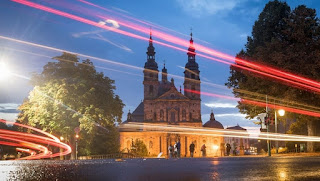Support for more religion, less politics in inter-religious dialogue in Germany
The German Bishops' Conferencing consults on an interreligious dialogue
"Less talking about political, more about religious issues"
"With cleverness and love"
Inter-religious dialogue is a theme of the autumn plenary session of the German Bishops' Conference in 2017.
In the domradio.de interview, the head of the Bishops Conference Special Office on Islamic-Christian Dialogue, Dr. Timo Güzelmansur, on the relationship between "Church and Islam".
domradio.de: You have over 35 years of experience in inter-religious dialogue. What fruits could you harvest?
Dr. Timo Güzelmansur (Managing Director of the Christian-Islamic Meeting and Documentation Centre, Bishops Conference): A lot. Above all, through the documents of the German Bishops' Conference, a discussion of the debate was carried out on issues such as mosque construction. The point is that we are not just talking about fear, but about people who are looking for places to practice their religion.
Another topic is Islamic religious education. The possibility that Muslims would like to pass on their religion adequately to the coming generations. This is not to take place somewhere in the back room, but in the school as equal citizens in this state and by scientifically well-trained persons. These are topics that would not have been achieved without the dialogue efforts of the Catholic Church.
domradio.de: With the AfD, a party which is very far right has now moved into the German Parliament. A deeply divided society in Germany can also be identified. Does this make your work more difficult?
Güzelmansur: Definitely. I myself experience when I am speaking, in a parish, in a church, or in an academy, that people there express questions or thoughts that may be close to this party.
This makes it difficult to talk with one another objectively and it creates fears. However, if you listen carefully and follow up, they are generalized judgments that have nothing to do with actual reality. That worries us.
domradio.de: You consult the German Bishops' Conferences with your specialist office and exchange information. What does this advice look like?
Güzelmansur: We are involved in different opinion-forming processes, we also pass on our expertise on various topics. I am also involved in the sub-committee "Inter-religious Dialogue". The flow of information and the exchange are also available - also bilaterally with the consultants of the sub-committees. We try to pass on our knowledge and competence to the various bodies.
domradio.de: Do you have a desire for inter-religious dialogue for the future?
Güzelmansur: I have the desire that we talk less about political and more about actually religious topics. We are religious people, carry out this dialogue out of deepest religious conviction and also want to understand the religious view of the others.
We want to see where we can work together for this society in a peaceful way so that we can develop our society in the best way possible. My wish is that we can make the good potentials of our religions available to other people and report on them.
domradio.de: Can you speak of a friendship created by the interreligious dialogue?
Güzelmansur: Yes. I notice this in many meetings with Muslim dialogue partners. You can always experience this at the Catholics events, on the podium, for example. There is a deep friendship with some Muslim dialogue partners. It is always nice to meet. You can tell, if you embrace, how to greet the other - this is always a nice experience.
Source










.jpeg)

Comments